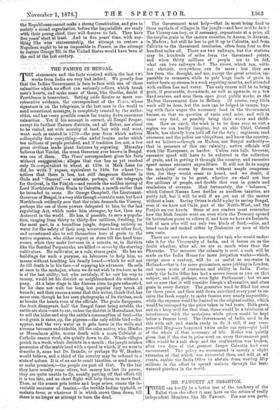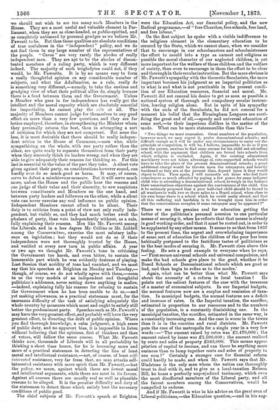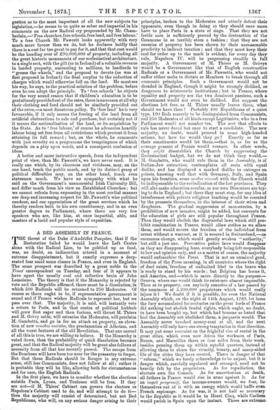MR. FAWCETT AT BRIGHTON.
T HERE can hardly be a better test of the tendency of the 1 Ballot than the effect it may have on the return of really independent Members like Mr. Fawcett. For our own parts, -we should not wish to see too many such Members in the House. They are a most useful and valuable element in Par- liament, when they are as clear-headed, as public-spirited, and as completely unbiassed by personal grudges as we believe Mr. Fawcett to be. But then these qualities are absolute conditions of true usefulness in the "independent" policy, and we do -not find them in any large number of the representatives of the people. " Caves " are very rarely the abodes of really independent men. They are apt to be the abodes of discon- tented members of a ruling party, which is very different indeed. The majority of such troglodytes could not, if they would, be Mr. Fawcetts. It is by no means easy to form • a really thoughtful opinion on any considerable number of subjects, and what the Adullamites, as a rule, really do is something very different,--namely, to take the envious and grudging view of what their political allies do, simply because there is a feud between them and the Government. Unless a Member who goes in for independence has really got the intellect and the moral capacity which are absolutely essential for impartiality, he cannot play the role at all. The majority of Members cannot judge for themselves to any good effect on more than a very few questions, and they are far better employed, therefore, in strengthening the Minister whom they personally esteem the best, than in attempting a sort of criticism for which they are not competent. But none the less, it is most desirable that there should be really indepen- dent critics in the House of Commons,—men who, while sympathising, on the whole, with one party rather than the other, are quite ready to separate themselves from their party when they sincerely think its leaders wrong, and when they are able to give adequately their reasons for thinking so. For this last is essential to the value of the part they take. A silent vote given against their party, on considerations however sound, can hardly ever do so much good as harm. It may, of course, serve to defeat a mischievous measure. But it will serve much more, unless the House and the public hear the reasons and can judge of their value and their sincerity, to sow suspicions between constituents and Members on the one hand, and between party leaders and followers on the other, while a silent vote can never exercise any real influence on public opinion. Independent Members cannot afford to be silent. Their duty is to criticise from a point of view not only really inde- pendent, but visibly so, and they had much better swell the 'phalanx of party, than vote independently without, as a rule, fully explaining their reasons. Men like Mr. Fawcett among the Liberals, and in a less degree Mr. Collins or Mr. Liddell among the Conservatives, exercise the most salutary influ- ence on legislation ; but they would not do so if their independence were not thoroughly trusted by the House, and verified at every new turn in public affairs. A year or two ago we thought Mr. Fawcett's tone in criticising the Government too harsh, and even bitter, to sustain the honourable part which he was evidently desirous of playing. Last Session that acridity of tone had vanished, and we must say that his speeches at Brighton on Monday and Tuesday,— though, of course, we do not wholly agree with them,—seem to us the very models of an independent and thoughtful politician's addresses, never setting down anything in malice, —indeed, explaining fully his reasons for refusing to sustain the Government when he has been unable to do so,—and yet making allowances, as a practical statesman must, for the enormous difficulty of the task of satisfying adequately the whole country by measures which must and ought to satisfy still better the predominant party. Speeches such as Mr. Fawcett's may have the very greatest effect, and probably will have the very ,greatest effect, in directing the drift of public opinion. Where you find thorough knowledge, a calm judgment, a high sense of public duty, and no apparent bias, it is impossible to listen without believing that the opinions, first of thinkers and then of voters, will follow the same course. What Mr. Fawcett thinks now, thousands of Liberals will in all probability be thinking a short time hence, for he is becoming more and more of a practical statesman in detecting the line of least moral and intellectual resistance,—not, of course, of least self- interested resistance, very far from that, no man attacks self- interested resistance with more spirit than Mr. Faweett,—but the policy, we mean, against which there are fewest moral and intellectual arguments, while there are most in its favour. Against all courses there are usually real as well as plausible reasons to be alleged. It is the peculiar difficulty and duty of the statesman to detect those which satisfy best the necessary -conditions of public good.
The chief subjects of Mr. Fawcett's speech at Brighton were the Education Act, our financial policy, and the new Radical programme,—of "free Churches, free schools, free land, and free labour."
On the first subject he spoke with a visible indifference to the religious element in the elementary education to be secured by the State, which we cannot share, when we consider that to encourage in our schoolmasters and schoolmistresses the effort to mould into a type as earnest and religious as possible the moral character of our neglected children, is yet more important for the welfare of those children and the welfare of society, than even to encourage in them the effort to be clear and thorough in their secularinstruction. But the more obvious is Mr. Fawcett's sympathy with the theoretic Secularists, the more important becomes his judgment as an impartial politician as to what is and what is not practicable in the present condi- tion of our Education resources, financial and moral. Mr. Fawcett did not conceal his desire to get as soon as possible a national system of thorough and compulsory secular instruc- tion, leaving religion alone. But in spite of his sympathy with the ends of the Secularists, he did not conceal for a moment his belief that the Birmingham Leaguers are sacri- ficing the great end of all,—speedy and universal education of some sort,—to their imperious dislikes in the matter of the mode. What can be more statesmanlike than this ?—
" Two things we must remember. Great numbers of the population, however much we may regret it, prefer denominational schools; and difficult enough as it will be under any circumstances to carry out the principle of compulsion, it will be, I believe, impossible to do so if you arm the parent, anxious to find some excuse for his child not attending school, with the argument that children are forced into schools from which religion is excluded. Again, if the existing educational machinery were not taken advantage of, rate-supported schools would have to take the place of the present denominational schools; a great additional charge would be thrown upon the ratepayers, and heavily burdened as they are at the present time, depend upon it they would object to this. Then again, I will earnestly ask those who feel their consciences so much offended by paying a few pence for some indigent child who is attending a denominational school, to weigh in the balance their conscientious objections against the convenience of the child. Can it be seriously proposed that a poor half-clad child should be forced in all weathers to walk two or three miles to a Board school, when close to his own home there is a school which he could easily attend, and that all this suffering and hardship is to be brought upon him in order that the conscientious scruples of some ratepayer may be appeased ?"
There we see the genuine zeal for education getting the better of the politician's personal aversion to one particular means of securing it, when he reflects that that means is already in good working order, and that it must be rooted out, in order to be supplanted by any other means. It seems to us that from 1839 to the present time, the urgent and overwhelming importance of some sort of education for the children of the poor has been habitually postponed to the fastidious tastes of politicians as to the best modes of securing it. Mr. Fawcett rises above this feeling. He sets a good example to everyone when he says, First secure universal schools and universal compulsion, and make the bad schools give place to the good, whether it be Board Schools or Denominational schools which are good or bad, and then begin to refine as to the modes.'
Again, what can be better than what Mr. Fawcett says
about the necessity of a reform in local taxation ? He points out the salient features of the case with the terseness of a master of economical subjects. In our Imperial budgets, the normal features now are a surplus and remission of taxa- tion. In municipal budgets, the normal features are a deficit and increase of rates. In the Imperial taxation, the sacrifice, estimated in proportion to our resources and to the numbers of the population, is a constantly diminishing one. In the municipal taxation, the sacrifice, estimated in the same way, is a constantly increasing one. And the case is worse in the towns than it is in the counties and rural districts. Mr. Fawcett puts the case of the metropolis for a single year in a very few words :—" The amount raised by rates was £3,470,000; the amount raised by loans was £3,100,000; the amount realised by rents and sales of property £580,000. This means appro- priation of capital to income, and can there be anything more ominous than to lump together rents and sales of property in one sum ?" Certainly a stronger case for financial reform could hardly be made, and when Mr. Fawcett says that Mr. Gladstone is the only man whom the nation can thoroughly trust to deal with it, and to give us a local-taxation Reform Bill, he bears a perfectly unprejudiced testimony, which even the most disaffected members of the Liberal party, and all the fairest members among the Conservatives, would .be compelled to endorse. And if Mr. Fawcett is wise in his advice on the great crux of Liberal politicians,—the Education question,—and in his sug.
gestion as to the most important of all the new subjects for legislation,—he seems to us quite as sober and impartial in his comments on the new Radical cry propounded by Mr. Chem- berlain,—'Free churches, free schools, free land, and free labour.' To a free Church Mr. Fawcett looks apparently with very much more favour than we do, but he declares boldly that there is a cost far too great to pay for it, and that that cost would be the handing over of £90,000,000 of property, including all the great historic monuments of our ecclesiastical architecture, to a single sect, with the gift (as in Ireland) of a valuable revenue in landed property, amounting to millions, to landlords to "grease the wheels," and the proposal to devote (as was at first proposed in Ireland) the final surplus to the reduction of charges which would otherwise fail on the land. He must see his way, he says, to the practical solution of the problem, before even he can adopt the principle. To free schools' he objects for the very sound reason that if children's education is to be gratuitously provided out of the rates, there is no reason at all why their clothing and food should not be similarly provided out of the rates,—a most disastrous policy. To 'free land' he is very favourable, if it only means the freeing of the land from all artificial obstructions to sale and purchase, but certainly not if it means the nationalisation of the land, or its acquisition by the State. As to free labour,' of course he advocates heartily labour being set free from all restrictions which prevent it from attaining its full reward ; but, on the whole, he comments with just severity on a programme the temptingness of which depends on a play upon words, and a consequent confusion of ideas.
A better and more instructive speech, from the independent point of view, than Mr. Fawcett's, we have never read. It is really one which, by its clearness and vividness, may, on the one hand, teach the public much, and by its distinct grasp of political difficulties may. on the other hand, teach even statesmen much. We have no sympathy with what he said on the Government's unsuccessful Irish University Bill, and differ much from his view on Established Churches ; but we cannot refrain from expressing in the most cordial manner our deep and increasing respect for Mr. Fawcett's wise political candour, and our appreciation of the great services which he thereby renders both to his own constituency, and in an even greater degree to Parliament, where there are very few speakers who are, like him, at once impartial, able, and masters of a lucid and popular style of exposition.




































 Previous page
Previous page